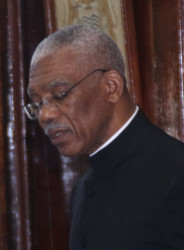Venezuela recently objected to the operation of Guyana Goldfields Inc’s Aurora Gold Mine, which President David Granger yesterday characterised as part of Caracas’ continuing efforts to hinder the development of Essequibo.
“Venezuela’s claims are not only illegal, they are injurious to the economic development of Guyana. Venezuela, therefore, must desist from hindering our economic development in an obtrusive and obstructive manner that is tantamount to interference in our internal affairs. It must desist from threatening investors who have a legitimate right to pursue their activities in our territory,” Granger told the National Assembly, where he reiterated Guyana’s interest in a juridical settlement of the ongoing border controversy.
For the third time since he was sworn in, Granger addressed the National Assembly and once again focused on the border issues and he touched for the first time on indications of Suriname’s renewed claims to the New River Triangle in south-eastern Guyana.
The President’s address was witnessed by members of the PPP/C opposition—its leader Bharrat Jagdeo slipped into his seat a few moments after the speech began—along with members of the diplomatic corps, including the recently returned Venezuelan Ambassador to Guyana, Reina Margarita Arratia Diaz.

Granger chronicled the history of the controversies existing with both Venezuela and Suriname and he said Guyana will continue to work with both countries to make the region a more peaceful and prosperous place and to pursue cooperation ar-rangements but not to the detriment of its territorial integrity and sovereignty. However, he made it clear that the “border takes first place.”
Addressing the continued tensions with Vene-zuela, Granger revealed that Venezuela, through its Ambassador to Ottawa, objected to Guyana Goldfields Inc’s Aurora operation in the Cuyuni-Mazaruni region.
In a letter to the Chief Executive Officer of the Canadian-based mining company, the Ambassador warned the company about infringing on the territorial sovereignty of Venezuela and committing unlawful actions which could incur legal consequences. “As such, you are hereby fully given notice of the respective legal actions that could herein occur,” the Ambassador said in the letter, dated October 13th, and which was read by Granger.
The President pointed out that the letter is in keeping with a statement by the late Venezuelan President Hugo Chavez during a visit in Guyana in 2004, when he said that while his country would not object to infrastructural work in Essequibo, major offshore oil exploration ventures, mineral exploration or the involvement of foreign governments were another matter. Venezuelan officials had also written ExxonMobil over its exploration for oil in Guyana’s water this year. ExxonMobil’s subsequent significant oil find was followed by a Venezuelan decree seeking to swallow up most of Guyana’s Atlantic waters including the area occupied by ExxonMobil.
Guyana Goldfields’ Aurora operation, which poured its first gold bar in August after almost two decades of development, is expected to produce between 30,000 ounces and 50,000 ounces of gold in 2015, and between 120,000 ounces and 140,000 ounces of gold in 2016.
It is projected to produce 3.29 million ounces of gold, averaging 194,000 ounces per year, over an initial 17-year mine life.
Granger once more emphasised that Guyana has always acted in accordance with the terms of the Geneva Agreement and noted that a juridical settlement is provided for under the Geneva Agreement.
“Guyana iterates that it has always remained committed to dialogue with Venezuela although its experience with dialogue on territorial-related issues never yielded encouraging results,” he said.
He charged that Venezuela’s provocations and aggression towards Guyana since independence are well known and he said through “unsubtle threats and undiplomatic coercion” Caracas has sought to establish itself as the arbiter of Guyana’s development of the entire Essequibo, which it still refers to as its zona en reclamación.
He also said Venezuela’s claim that Guyana is an aggressor defies logic, while noting that Guyana has consistently reacted with dignity and firmness and on the basis of compliance with international law. He said Guyana, despite the losses, assaults and injuries which have been inflicted on it, has always been respectful to the government and people of neighbouring states, confident in the correctness of its policies and in the justice of its case. Guyana, he added, has no need to resort to force to advance its rights.
On Suriname, Granger said Guyana is confident that the boundary between the two countries was definitively established by 1936.
He said the meaning of President Desi Bouterse’s recently reported statements that the New River Triangle issue will be placed “back on the agenda” is unclear. According to the President, if Suriname is convinced that its claim can withstand legal scrutiny, then it should agree to the matter being placed before an internationally-recognised adjudicatory body.
“Guyana is of the view that, if an agreement cannot be reached at the bilateral level within a given time-frame, the matter should be taken to adjudication so that this controversy can be concluded,” he said.
The President said the two countries can find a way of resolving its differences without acrimony or the use of force in a spirit of cordiality.
“We must bring finality to our difference in permanent and internationally recognised legal manner,” he added.
The controversy with Venezuela was reignited in May when Venezuela’s President Nicolás Maduro issued a Decree claiming most of Guyana’s territorial waters along the Essequibo Coast. Since then, Guyana has been pushing for a juridical settlement of the issue, while there has been a deterioration of relations between the two countries.
Venezuela decided against the renewal of a key rice agreement with Guyana and recently announced that it would be sourcing the grain from Suriname. It had also announced a review of relations with Guyana and recalled Diaz.
Caracas has also mounted an aggressive lobbying campaign in Caricom which has seen the doling out of concessions and deals with Antigua, Suriname and other members of the regional integration movement.





